By Cristina McKay, cofounder of EVERBELLA • This article ends with a link to an EVERBELLA product that contains many of the ingredients discussed.
A few years ago, I was losing my hair in handfuls — and I hadn’t even turned 30 yet! This led me down a path of self-education that included what hair actually is, how it grows, and what stunts its growth.
While I discovered that my hair loss was happening due to a nutrient deficiency (I’ll get into nutrients for hair growth later on), I also learned that many people experience changes in their hair as they age. For example, after the age of 65, 53% of men and 37% of women will experience hair loss. And after the age of 30, there is a 10–20% decrease in the amount of melanin produced for each following decade, meaning that by age 50, half of all people will have at least 50% gray hair.
If you’re experiencing age-related hair loss — such as female or male-pattern baldness — this isn’t an indicator of poor health. But, you may still feel psychosocial and psychological effects such as stress, anxiety, and depression. So, by providing information on how hair grows and what you may be able to do to support it, hopefully, I can help you through these feelings or prevent them from ever happening at all!
Let’s start with exploring how hair grows…
The Hair Growth Cycle Explained
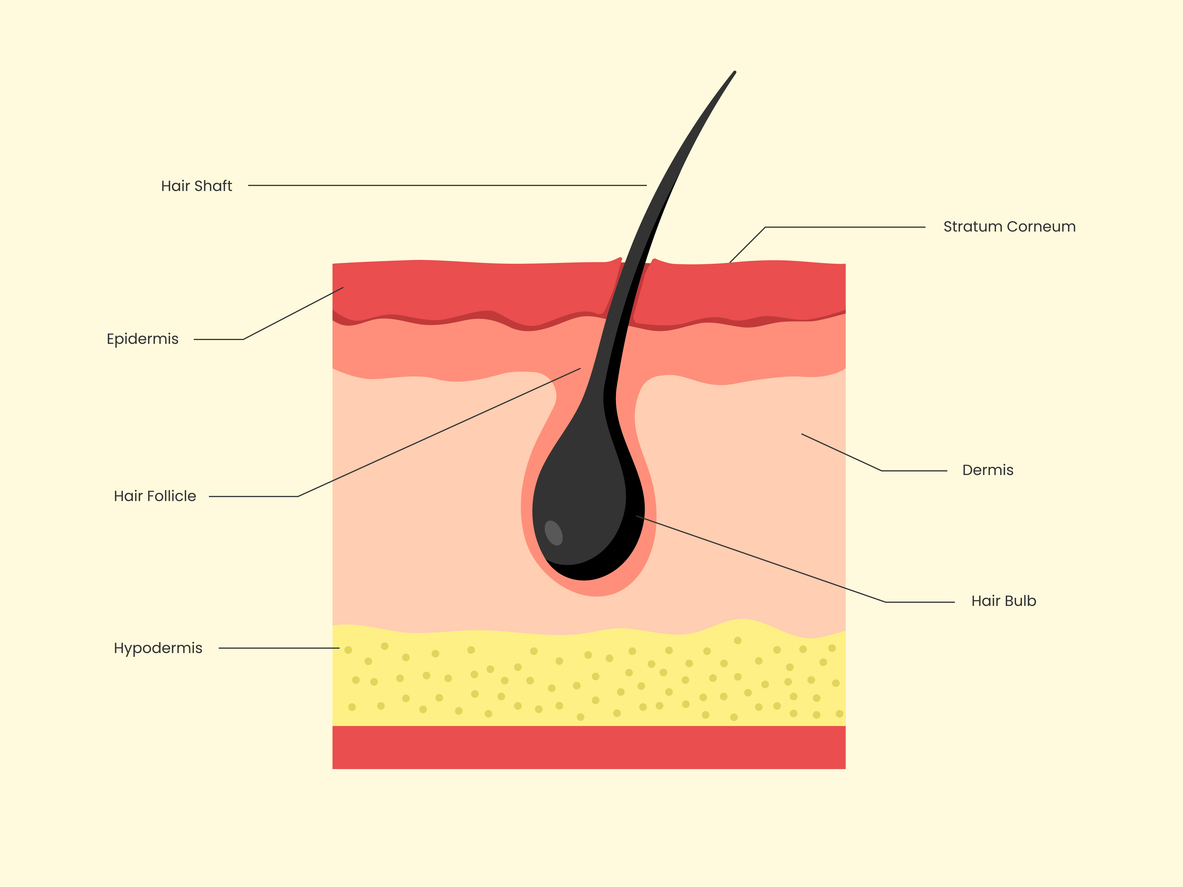
What’s in a Hair Follicle?
There’s more to a strand of hair than you may think. See, each hair starts within its own hair follicle. You have about 5 million hair follicles across the entirety of your body, except for your lips, palms, and the soles of your feet. They extend into the second (middle) layer of your skin, with some even reaching into your third (deepest) skin layer.
At the bottom of these hair follicles is the hair bulb. This is where blood vessels are connected to the follicle to feed it nutrients and oxygen. This fresh supply helps your hair cells divide and push upward, gradually hardening to form what will become hair.
Your hair shape and color are also determined by the bulb. Here, specific cells, called melanocytes, make the pigment called melanin that gives your hair its color. And the shape of hair is determined by the shape of your hair follicle.
Within your hair follicle is also a sebaceous gland, where your hair oil — called sebum — is created. This oil helps to keep your hair hydrated. There’s also a tiny muscle called the arrector pili muscle that’s attached to each hair follicle. Its main task is to make your hair stand up straight when you get goosebumps.
The Hair Shaft
Then there’s the hair shaft, the beginning of the hair that you see above your skin. Your hair is made of a protein called keratin that’s compacted and fused together. Keratin is a remarkably strong protein that’s quite resistant to wear and tear. It’s also the same material that nails, claws, hoofs, horns, and feathers are made of.
Your hair shaft is made up of three layers:
- The cuticle — This is your hair’s protective layer, composed of overlapping downward-facing cells, like roof tiles or fish scales. If your cuticle is healthy, it will be smooth and flat with a shine that protects the inner layers from damage. Harsh hair products and excessive heat can damage this layer, lifting the cells and causing inner damage, including dryness.
- The cortex — This is the thickest part of your hair and where the pigment that makes up your hair color lives. Made up of keratin, its health is largely dependent on the protection offered by the cuticle.
- The medulla — Only people with thick hair have this innermost layer, a soft area deep in the hair made of cells and tiny air pockets.
The process of hair growth is intricate and complicated, meaning there’s a lot of room for something to go wrong. But this is just the beginning. Hair follicles aren’t constantly pushing out new hairs. Instead, they’re constantly moving through different phases known as the hair growth cycle.
What Are the Stages of the Hair Growth Cycle?
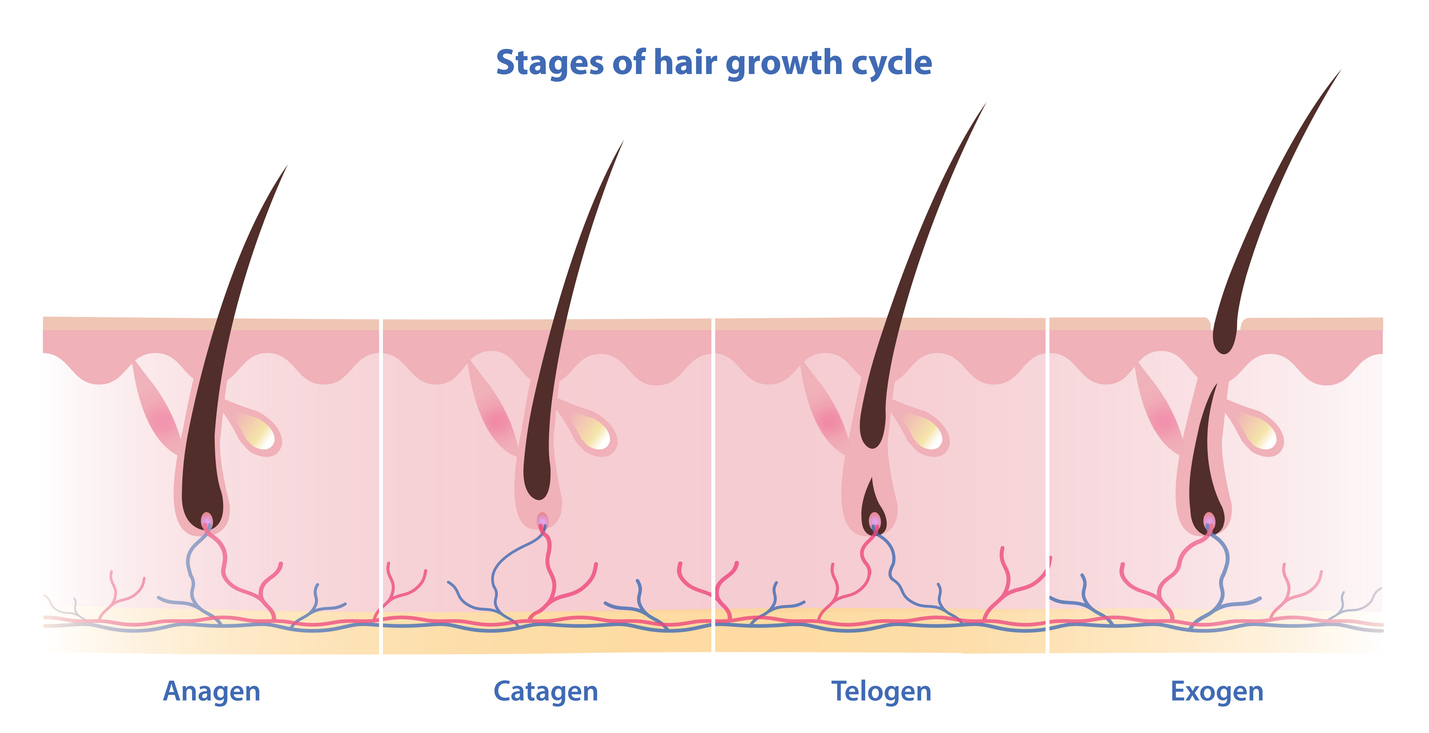
Your hair follicles cycle through four different stages to help create new hairs for continual growth. From your eyebrows to your arm hair, these cycles can vary all over your body. But let’s focus on the hair follicle cycle of your scalp.
There are four stages to hair growth:
Anagen: the growing phase — This is the longest phase of the cycle. It averages about three to five years but lasts as long as seven years in some cases. During this phase, hair follicles push out hairs that will continue to grow until they are cut or end their lifespan and fall out. At any time, about 90% of the hairs on your head are in this stage.
Catagen: the transition phase — This stage picks up right where the anagen phase left off, lasting about 10 or so days. At this time, hair follicles shrink, growth slows, and the hair separates from the follicle. Roughly 5% of your hairs are in this stage at any time.
Telogen: the resting phase — This typically lasts around three months. After the hair separates from the follicle in the catagen phase, new hairs begin to form in the follicle. The recently separated hair remains in place, neither growing nor falling out.
Exogen: the shedding phase — This phase is why you lose, on average, 50–100 hairs daily. During this phase, which lasts about two to five months, new hairs typically grow in the follicles to replace the fallen hair, as the anagen cycle begins.
Sometimes, thinning hair just has to do with the hair growth cycle getting “stuck,” meaning your head is shedding hair (the exogen phase) without reentering the growing (anagen) phase. As you’ll learn later on in this article, there are certain nutrients that help regulate this cycle to keep it in full swing.
Outside of the hair growth cycle stalling, let’s explore other common reasons why hair may change as we age and the science behind it.
Why Does Hair Change as You Age?
As you age, you may notice changes in your hair, which can affect everything from the color to the shape and thickness.
Graying and Other Changes
Hair follicles contain melanocytes — cells that produce melanin, which determines your hair color. Without the pigment melanin provides, your hair would always be white or gray. And this is precisely the color our hair turns as we age.
As such, gray hair is believed to be caused by exhausted melanocytes in an aging hair follicle. It’s thought that oxidative stress caused by free radicals may be what wears down these cells.
If you have gray hair, you’re also more susceptible to damaged or lost hair. Gray hair is more sensitive to breakage through combing and the effects of UV rays, which can weaken hair through protein loss, cause color changes, and increase free radicals.
A reduction in your hair’s natural oils also decreases with the incidence of gray hair. The natural production of hair oils via the sebaceous glands remains high until the age of 45–50 when it starts to decline. This decline is greater in women than in men.
Hair curvature also tends to increase with age. Remember when I said that the outer layer of your hair is made of a scaly collection of cells facing downward to protect the inner layers? Well, with curly hair, there are more spots where this protective cover can be slightly lifted, leaving the inner layers vulnerable to damage and dehydration.
All of this mixed together makes it difficult to keep and maintain healthy hair as you age.
The Main Causes of Hair Loss
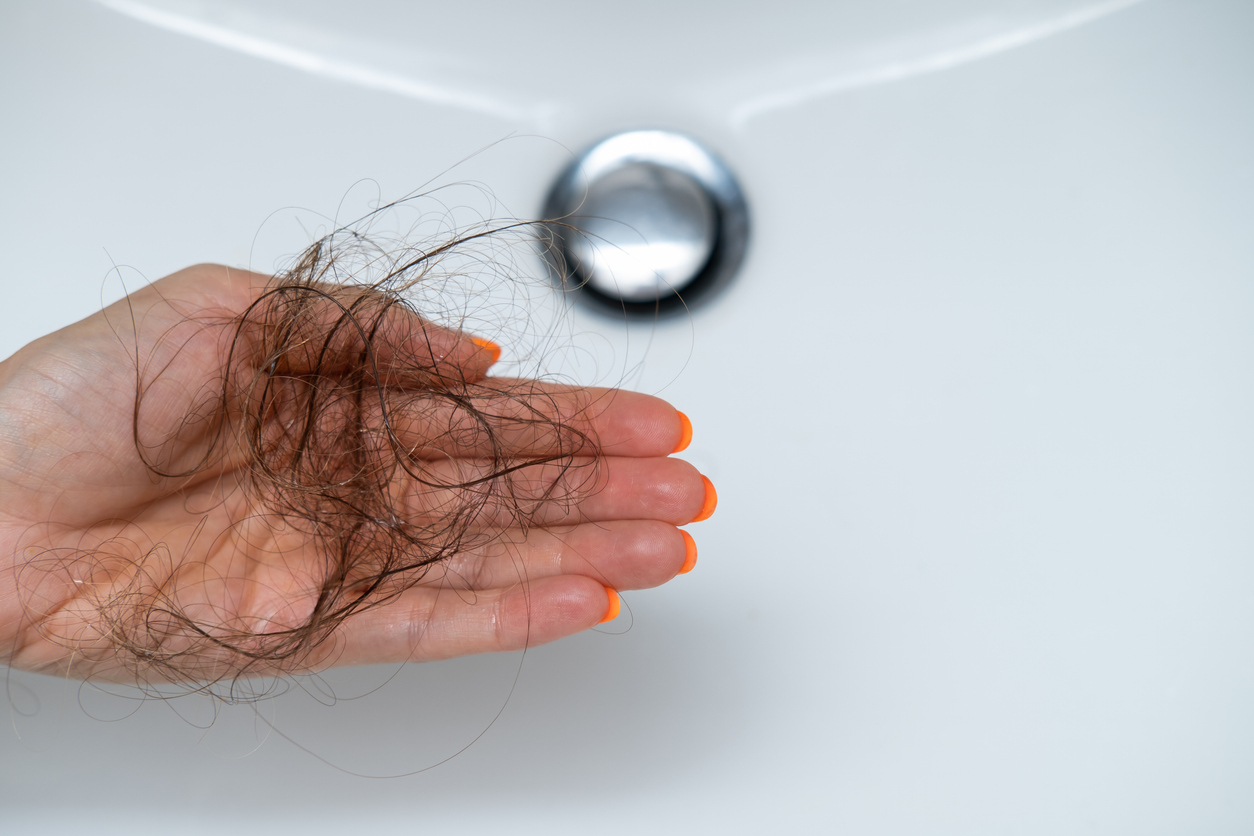
Most experts agree that the following are the main reasons why people lose their hair as they age:
- Genetics
- Inflammation
- Hormonal changes
- Medications and chemotherapy
- Stress
- Hairstyles and treatments
- Aging
The Science Behind Hair Loss as We Age
For women, research has shown that hair diameter actually increases with age, up until they’re in their forties, when it tends to begin decreasing. This is why most women won’t notice thinning hair until they’re older. Meanwhile, men were found to have hair diameters peak in their late teens and then decrease relatively rapidly as they aged.
The unfortunate part is that we don’t fully know the reasons why people lose or don’t lose their hair. Like most things, the true cause of hair loss probably isn’t just one singular thing that’s the same for everyone but rather a mixture of the main causes mentioned above.
For example, the hair growth cycle is highly affected by various hormones. Increased levels of cortisol — a hormone released when we’re stressed — can negatively impact the function and cycle regulation of hair follicles. And postmenopausal women have been shown to have significantly lower hair diameters than nonmenopausal women, likely due to the hormonal effects of menopause.
To thicken the plot even more, a 2018 study in the International Journal of Trichology found that hair loss in balding participants sometimes went through periods of stability and even remission. This could indicate that lifestyle factors might be able to slow or even prevent balding in some individuals.
Research also indicates that, as we age, our hair follicles may stop producing new hairs altogether. And in those with certain genetic factors, aging might actually shrink their hair follicles.
There are clearly many factors that impact the health of your hair — and not all of them are in your control. But there are some things you can do that will help bend the odds, perhaps even dramatically. This is why I believe a holistic approach is the key to a healthy head of hair. Below, I’ll list ten ways for you to nurture your hair so you can have the healthiest locks possible.
10 Ways to Keep Your Hair Strong and Healthy as You Age
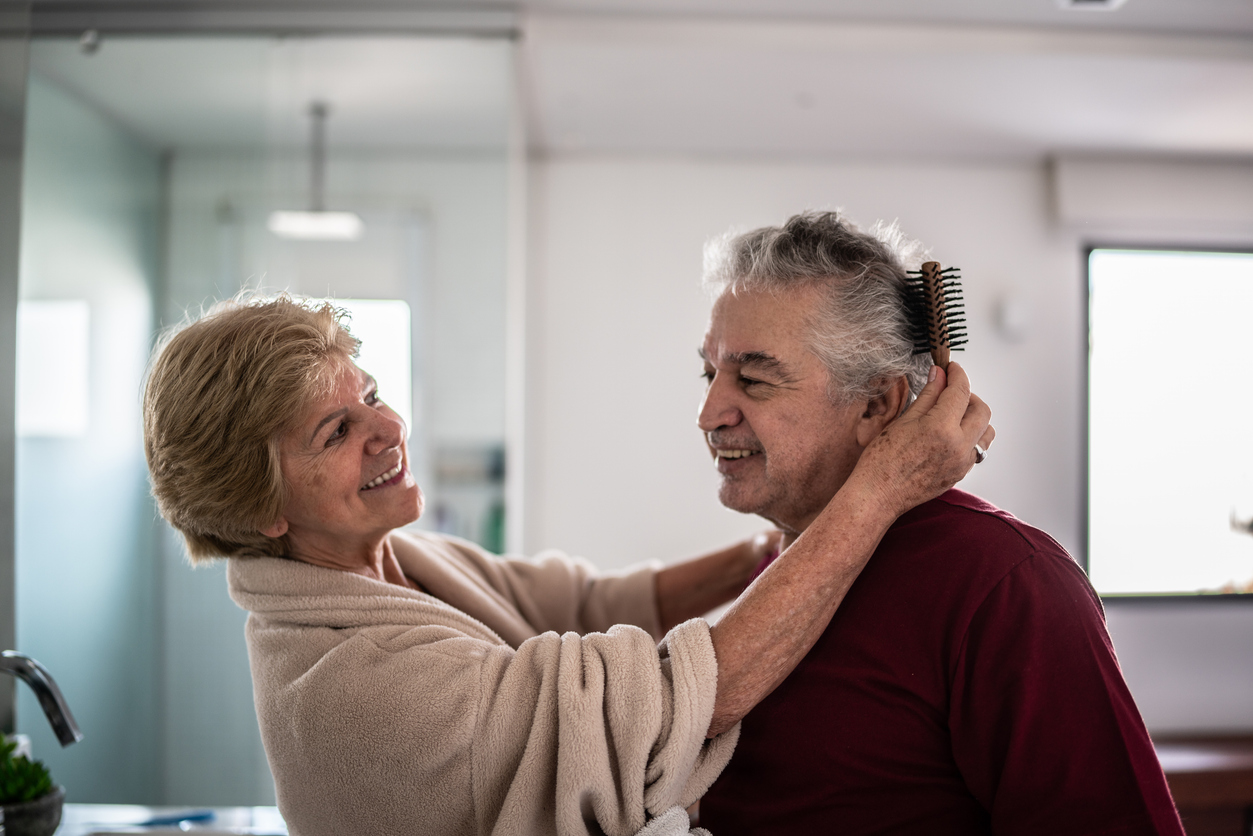
Your hair is pretty vulnerable up there on your head. And even some things you may do to it with good intentions may actually be harming it. So let’s look at ten ways you can protect your hair as you age.
1. Keep Hormones Balanced
Hormones are chemical messengers within your body responsible for sending signals between your body’s systems and regulating the cells within.
Hormones have a major impact on the hair cycle and hair follicle structure, with many hormones controlling hair growth, cycle, and density.
Here are some of the hormones that affect hair growth and health:
- Androgen hormones like DHEA and testosterone are the main regulators of human hair follicles. However, if levels of certain androgens (such as DHT) are too high, this can actually cause hair loss.
- Estrogen affects the growth cycle of your hair, the health of your scalp and follicles, and the natural oils that keep your hair smooth and lustrous.
- Thyroid hormones can disrupt the hair growth cycle if levels go too far above or below their normal ranges.
- Cortisol has been dubbed “the stress hormone,” as it rises when you’re stressed, scared, or anxious. It affects the function and cycle of the hair follicle.
For more on how to balance hormones naturally, see FRN’s article, here.
2. Don’t Wash Every Day — or Do?
Shampooing removes dirt and debris from your hair and scalp, helping to keep them healthy. But you may not need to shampoo every day or even every week. It all comes down to how dry vs oily your hair is naturally.
Your hair is likely naturally dry if it is:
- Thick
- Curly
- Gray or graying
- Regularly treated with harsh cosmetics
Hair can also vary based on ethnicity. For example, people of African descent tend to have curlier hair, while people of Asian descent tend to have thicker hair. This means people of these ethnicities may be more likely to have naturally dry hair, may need to shampoo less frequently, and may benefit from supplemental moisture.
If you instead have naturally oily hair, it will be best to shampoo more regularly to keep your hair and scalp happy. Hair that’s very fine or straight is more likely to be oily.
Be sure not to damage your hair by over- or under-washing. Pay attention to when your hair looks and feels oily, and only shampoo when needed. Otherwise, rinsing with water should be sufficient between washes.
3. Choose the Right Products
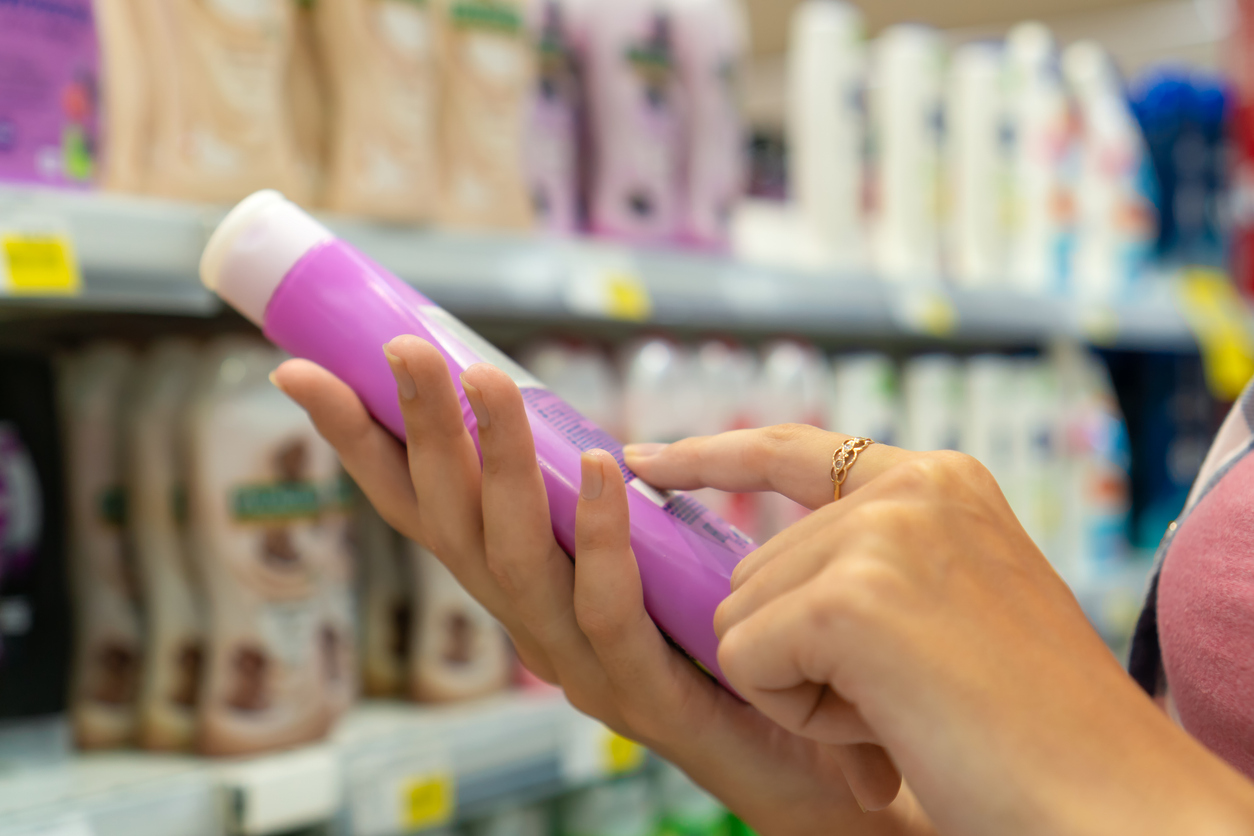
Many shampoos, conditioners, and other hair products contain harmful ingredients that may offer short-term effects like a shiny or silky feel but ultimately harm your hair long-term.
Here are some ingredients you should watch out for when buying hair products:
- Sulfates — Sulfates bring out the bubbly lather in shampoos that helps scrub dirt from your scalp and hair. It may feel like a nice way to wash, but sulfates can damage the sensitive skin of your scalp or affect the texture of your hair. Some sulfates may also contain a carcinogen called 1,4-dioxane.
- Parabens — Sometimes referred to as methylene glycol or formalin (formaldehyde), this preservative may cause skin irritation or hormone disruption and may contain carcinogens.
- Silicone — Another preservative, silicone can build up on your hair, drying it out and causing damage.
- Phthalates — Phthalates are currently under investigation for how they affect hormones in the body. While they’re banned in countries like Canada, they don’t need to be fully acknowledged on US ingredient lists and are often hidden behind words like “fragrance,” even if they make up 20% or more of the product.
Other harmful hair ingredients include alcohol, chemical dyes, or added fragrances. I don’t say all this to scare you but to let you know that some of your hair “care” products may actually be working against the care of your hair. But it’s not hopeless! Consider homemade alternatives when possible, or use brands you trust.
4. Be Wary of Environmental Factors
While you may wear sunscreen to protect your skin from the sun, did you know that UV rays can damage your hair, too?
Both UVA and UVB rays cause damage to your hair by breaking down crucial protein bonds and creating holes within the protective cuticle layer. This slowly destroys the structural integrity of your hair. The lighter your hair, the more at risk it is from UV damage due to lower levels of melanin (which protects against UV rays).
Pollution is another threat to your hair’s health. There are several different types of pollutants in our air and environment that can damage your hair follicles. This could affect hair growth, sebum production, and more.
Consider wearing a hat instead of having the sun beat down on your hair. And give your hair a good wash if you think you may have been exposed to air pollution.
5. Take Scalp Care
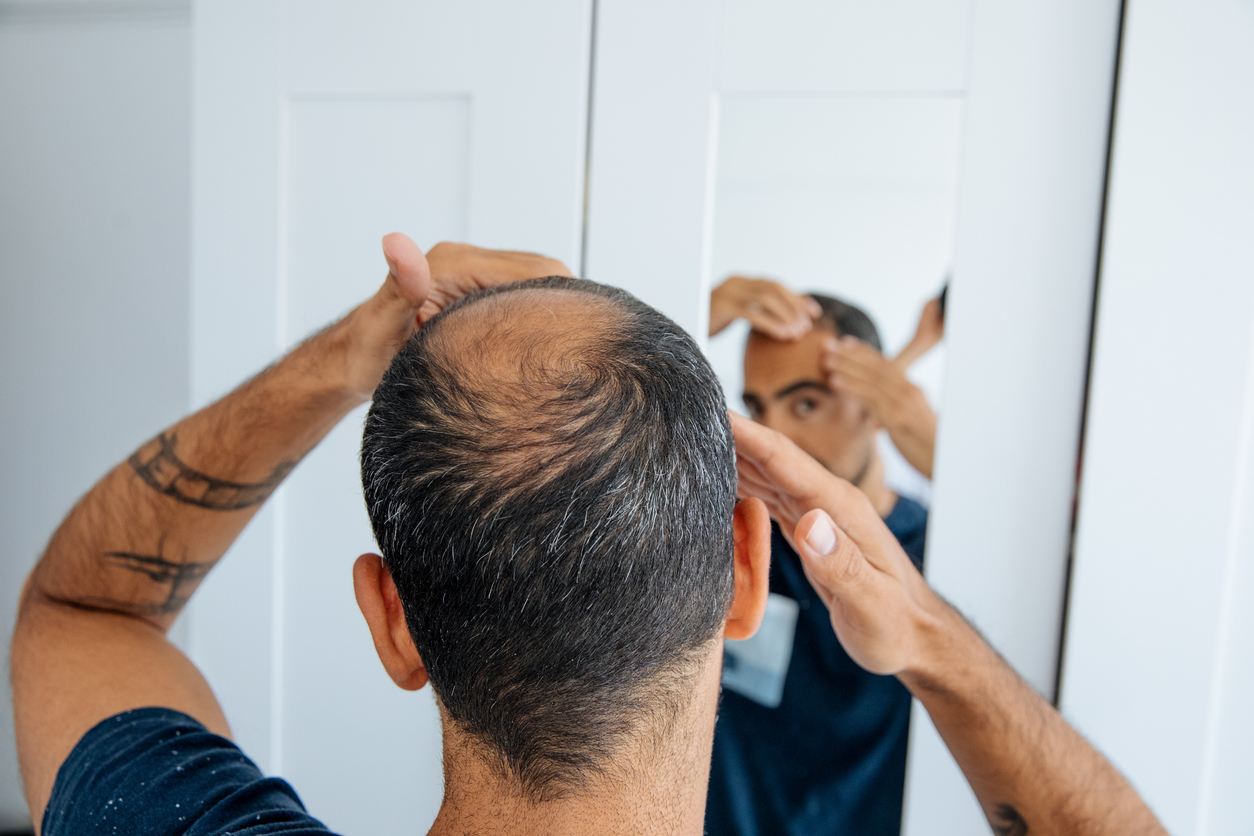
Healthy hair starts with the hair follicles within the scalp. As such, keeping a healthy scalp is key to hair that grows strong and happy.
A healthy scalp is clean and hydrated, with good blood circulation and balanced oil production. Signs that your scalp is struggling include inflammation, itchiness, and flaking (dandruff).
Often, an unhealthy scalp can be easily fixed. If you’re struggling with an unhealthy scalp, it’s likely caused by a hair product, over- or under-washing, UV damage, a nutritional deficiency, or one of the other things discussed in this article. Consult with your health care team (such as a dermatologist) if you want help getting to the root (so to speak!) of the problem.
6. Monitor Stress Levels
As discussed earlier, the stress hormone cortisol can negatively affect hair follicles. A study done on mice (FRN’s view on the use of animals in medical research is here) demonstrated that removing stress hormone glands allowed for new growth and hair follicle regeneration, which didn’t slow with age. Not that removing stress hormone glands altogether is necessarily a good idea, but this study does underline the stress-hair connection.
Stress can also cause certain hair loss conditions, including trichotillomania, where hair is lost through fidgeting or pulling, and alopecia areata, where the body’s immune system attacks hair follicles.
The good news is that stress-induced hair loss doesn’t have to be permanent. Though easier said than done, finding ways to de-stress can help regular hair growth return.
7. Check Your Medications
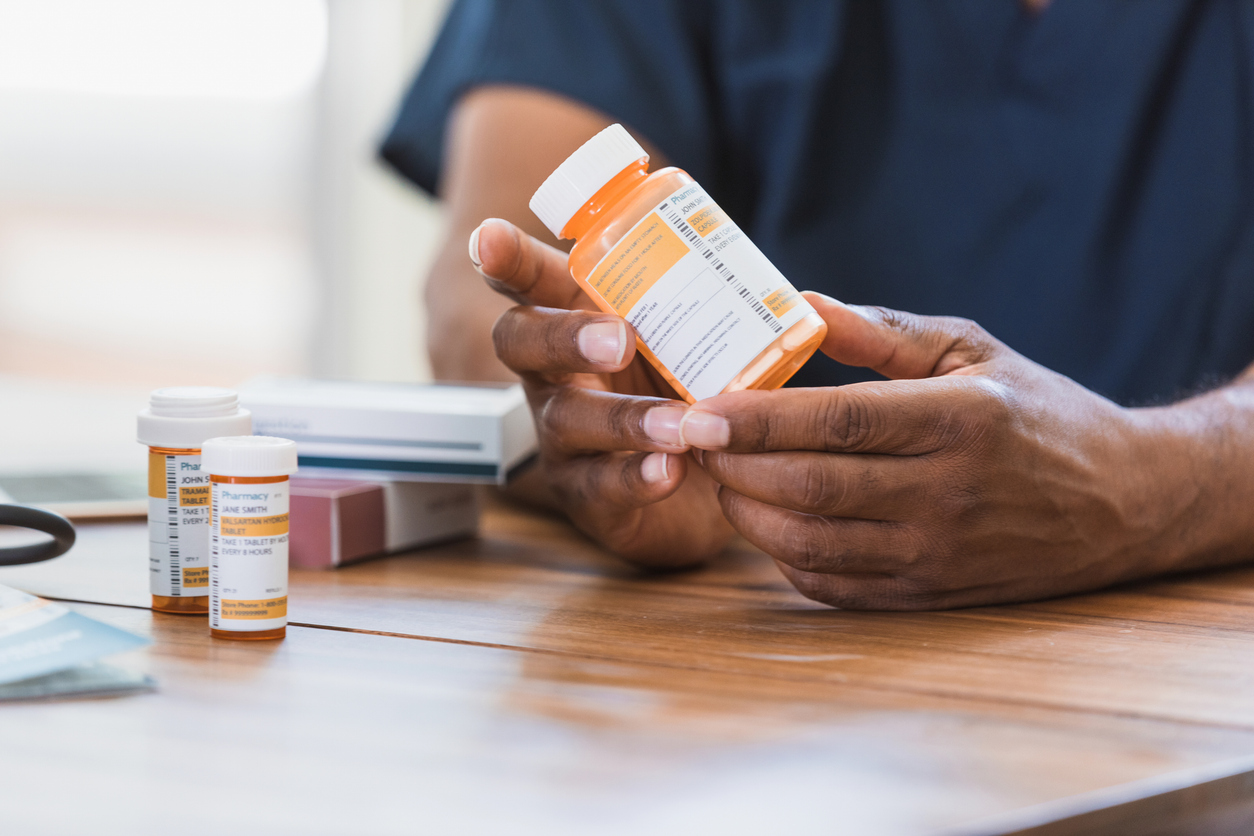
While medications can help you with certain health conditions, they may come with unwanted side effects such as hair loss. This can result from the hair growth cycle being disrupted or sent into the resting phase indefinitely, which is medically known as telogen effluvium. In this case, hairs fall out in high numbers prematurely, and the hair follicles struggle to grow new hairs fast enough.
Many different types of medications are thought to cause hair loss, including:
- Acne medications
- Antibiotics and antifungals
- Antidepressants
- Birth control pills
- Anticonvulsants
- High blood pressure medications
- Pain medications
- Steroids
- Thyroid medications
- Chemotherapy drugs
If you’re on a medication that could impact your hair health, discuss your options with your doctor. Simply knowing whether or not your medication might be causing hair loss can help you better understand your hair situation.
8. Practice Good Hair Habits
Sometimes, the little things we do each day add up and damage (or protect) our hair. Following these general hair care dos and don’ts can go a long way toward protecting your hair.
Good hair care habits include:
- Conditioning after you shampoo
- Avoiding heating tools as much as possible
- Allowing your hair to air-dry when you can
- Being gentle with your hair when it’s wet
- Not wearing (or wearing less frequently) tight ponytails or other hairstyles
- Getting regular haircuts
Daily efforts to avoid stressing out your hair and focusing on upkeep can have a great impact on your locks long-term.
9. Get the Right Amount of Protein
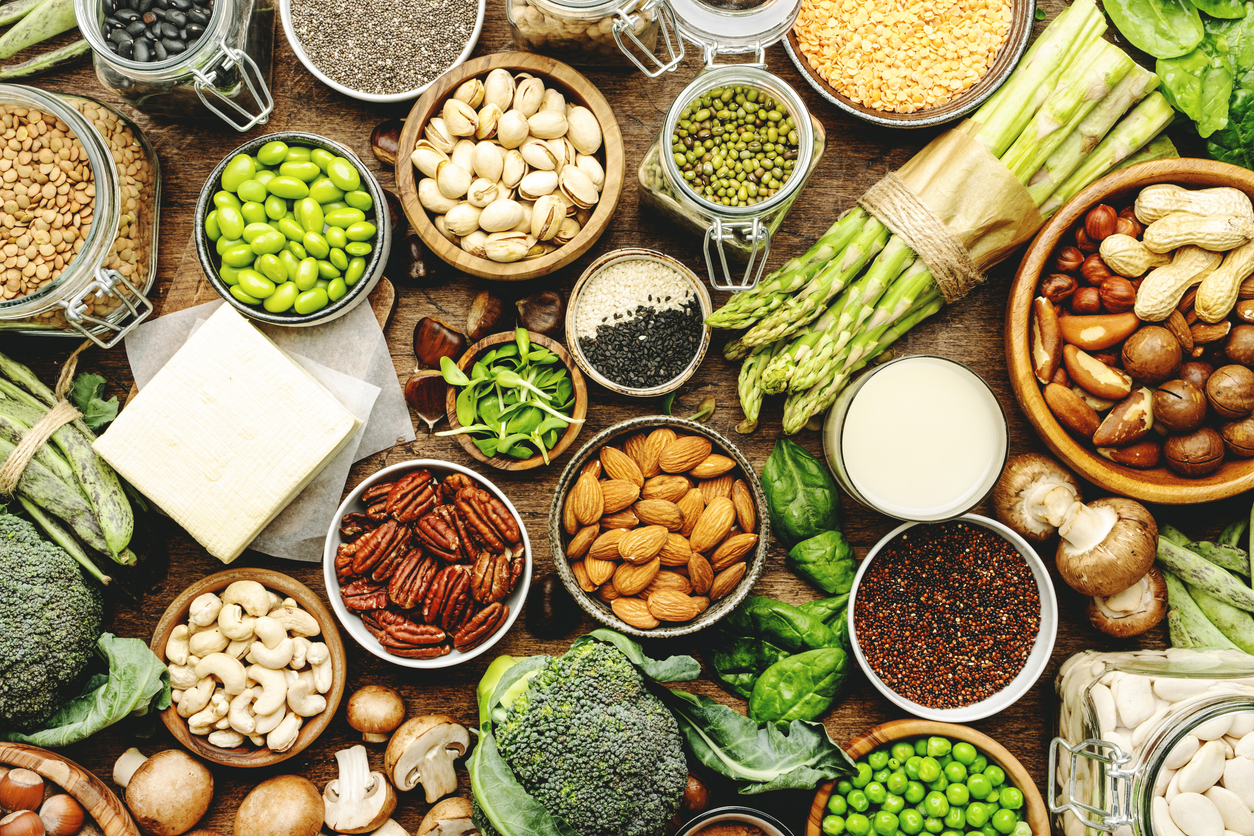
Your hair is mainly made up of a protein called keratin. To properly build keratin, your body needs the building blocks of protein: amino acids. By consuming proteins in your diet, you can get a wide range of amino acids for keratin production.
This is why low protein levels are linked to hair thinning and hair loss. See, hair growth isn’t on the top of the priority list in your body. If you’re low on protein, your body will use the limited protein it has for more necessary functions, such as muscle control and structural support. As such, your hair will have to go without. And since your hair is almost fully protein, your hair going without protein might mean you going without hair.
It’s important to note that too much protein can also be a problem (especially if it comes from animal products) and that you can get plenty of protein from plant-based sources.
For more on how much protein you need and the best ways to get it, see FRN’s article, here.
But there are other important nutrients to take in, too, if you want healthy hair.
10. Take in Other Hair-Healthy Nutrients
While hair is mostly made of keratin, it and its follicles require other nutrients besides protein for proper health and function.
- Biotin — Biotin, or vitamin B7, is essential for keratin production. One study tested women struggling with hair loss, finding that 38% were unknowingly deficient in biotin. For more on B vitamins, see FRN’s article, here.
- Iron — Iron deficiency is also linked to hair loss, as iron helps red blood cells carry oxygen throughout the body, including to your hair follicles. For more on iron, see FRN’s article, here.
- Vitamin E — This vitamin is an antioxidant that can help neutralize harmful free radicals within the hair follicles. One study found that people with hair loss experienced over 34% more hair growth after taking a vitamin E supplement for eight months. But vitamin E supplements can have some downsides, too. For more on vitamin E, see FRN’s article, here.
- Antioxidants — Speaking of antioxidants, this entire class of compounds helps protect your cells and organs (including hair follicles) from oxidative stress and inflammation caused by free radicals — two common factors when it comes to hair loss. For more on antioxidants, see FRN’s article, here.
- Vitamin D — Research has shown that those with hair loss conditions tend to be low in vitamin D. This is because vitamin D plays a role in the hair growth cycle as well as the regulation of key hormones involved in hair health. For more on vitamin D, see FRN’s article, here.
- Selenium — This mineral acts as an antioxidant within your thyroid, protecting hair-boosting hormones from free radicals. But with low selenium, your thyroid function can become impaired, causing an imbalance of these hormones. Additionally, researchers have found that new hairs actually pull selenium from the blood to boost growth. For more on selenium, see FRN’s article, here.
Outside of essential nutrients that are beneficial to your hair health, there are also a number of ingredients that have been shown to be beneficial for growth:
- Black cumin seed oil — Daily intake of this powerful antioxidant showed a 76% reduction in hair loss in a 2017 study. And another study found that it triggered hair growth in those with telogen effluvium (nonscarring alopecia). For more on cumin and black cumin seed oil, see FRN’s article, here.
- Pumpkin seed oil — This oil was brought to the forefront of hair health when a 2014 study showed that those taking pumpkin seed oil every day saw 40% more hair growth than those taking a placebo.
- Cinnamon — Not only can this delicious spice stave off dandruff and dryness, but in one study it was observed to be just as effective in boosting hair growth as a common hair growth drug. You might want to choose Ceylon cinnamon over cassia cinnamon when possible to avoid possible liver damage from coumarin content.
As you can see, your hair relies heavily on not just what you do to it topically but what you provide it internally. To have strong and nourished hair, ensure you’re taking in nutrients and ingredients to help your hair follicles thrive.
Bald Doesn’t Mean Bad
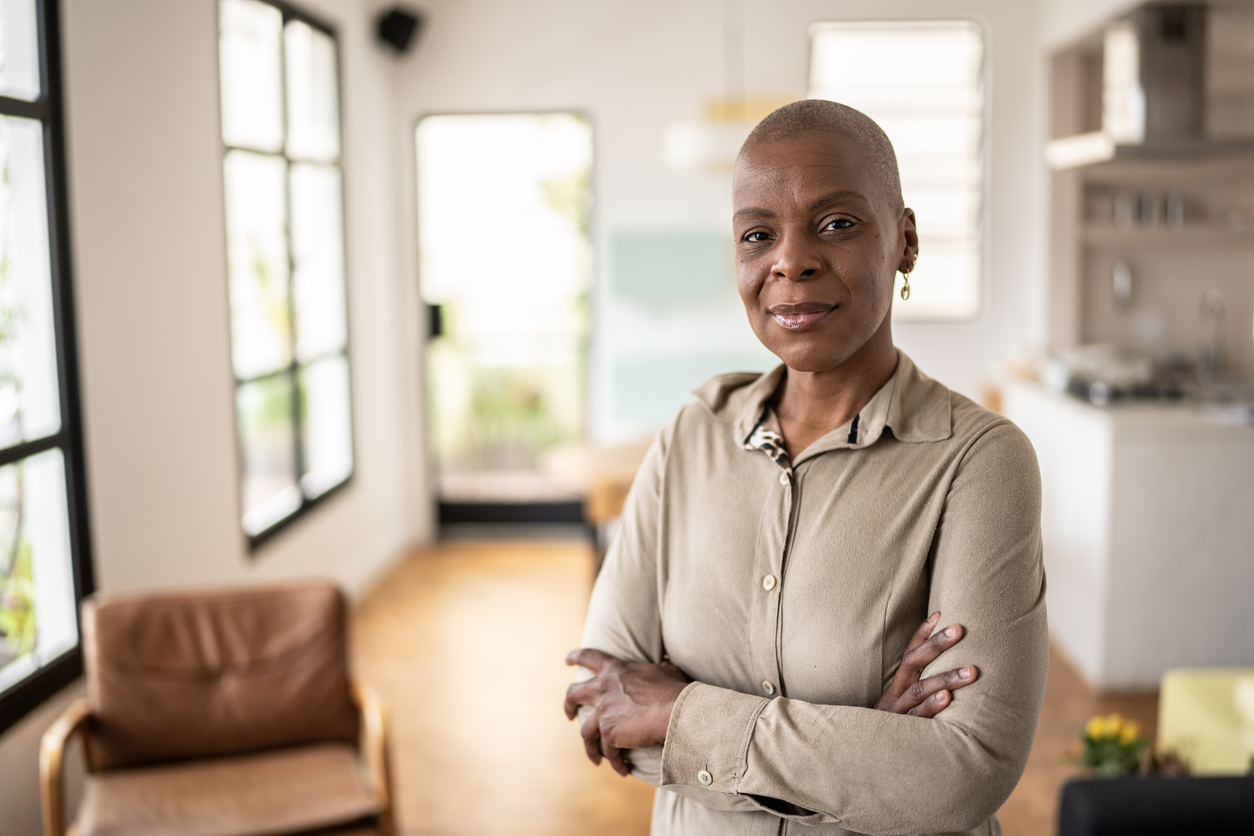
Though there are many options for people who are worried about lost or thinning hair, sometimes hair loss comes with age, and there isn’t much we can do about it. But if you’re going bald, it’s not all bad.
First, it’s important to remember that losing your hair isn’t an indicator of poor health. You can be in top-tier health and still experience hair loss. But if you’re losing your hair, you don’t have to lose yourself. It may be a difficult adjustment, but accepting your new look and remembering that you are not your hair may be your best option.
For men, one study found that women actually found bald men who had a good personality more attractive than non-bald men with a similar personality. And another study showed that bald men were consistently rated as more intelligent, influential, knowledgeable, well-educated, of high social status, honest, and helpful than their non-bald counterparts.
For women, embracing baldness can be more difficult. More men experience baldness, but a bald woman may stick out from the crowd, meaning more people will notice you. This extra attention may not be for everyone, but some women are leaning into their baldness, showing others that it’s okay to be a bald woman. Famous examples include model Amber Rose, actress Jada Pinkett Smith, and actress and TV host Ricki Lake.
For those who don’t want to stand out so much, there are plenty of different types of wigs, headscarves, and other accessories to play with.
Taking Care of Your Hair
Now that you know the ins and outs of hair, the latest research on why people lose their hair as they age, and ways you can support your hair, I hope next time you look in the mirror, you see more than just hair, but an intricate cycle of growth sprouting from your follicles.
The color, shape, texture, and longevity of your hair are some things you can influence, perhaps even profoundly. But they’re also not completely within your control.
And there’s still one more piece of information I want to share with you…
Why are hairdressers never late for work?
Because they know all the shortcuts!
Tell us in the comments:
- Do you struggle with hair loss?
- What other hair concerns do you have?
- Do you utilize any of the hair-protecting practices discussed in this article?
Featured Image: iStock.com/shurkin_son



